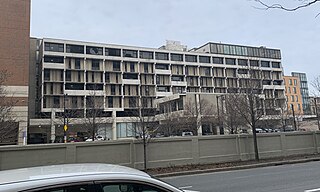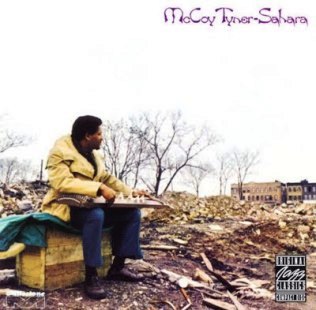Related Research Articles

"Combat Zone" was the name given in the 1960s to the adult entertainment district in downtown Boston, Massachusetts. Centered on Washington Street between Boylston Street and Kneeland Street, the area was once the site of many strip clubs, peep shows, X-rated movie theaters, and adult bookstores. It had a reputation for crime, including prostitution.

"Too Many People" is a song by Paul McCartney from him and his wife Linda McCartney's 1971 album Ram. It was issued as the B-side of the "Uncle Albert/Admiral Halsey" single. It was also included on The 7" Singles Box in 2022.

Sid Torin, known professionally as "Symphony Sid", was a long-time jazz disc jockey in the United States. Many critics have credited him with introducing bebop to a mass audience.
Alan Dawson was an American jazz drummer and percussion teacher based in Boston.

The Roseland Ballroom was a multipurpose hall, in a converted ice skating rink, with a colorful ballroom dancing pedigree, in New York City's theater district, on West 52nd Street in Manhattan.

575 Commonwealth Avenue is a dormitory at Boston University. Until 2001 the building was a Howard Johnson hotel owned by the University. It is located in Kenmore Square next to the Rafik B. Hariri Building, which houses the Questrom School of Business.

Steven Hunt is an American jazz pianist and composer. He has released two studio albums, recorded extensively, and toured the world.
Roland Alexander was an American post-bop jazz musician.

Sahara is the twelfth 1972 album by jazz pianist McCoy Tyner, his first to be released on the Milestone label. It was recorded in January 1972 and features performances by Tyner with saxophonist Sonny Fortune, bassist Calvin Hill, and drummer Alphonse Mouzon. The music shows African and Eastern influences and features all the musicians playing multiple instruments, with Tyner himself utilizing koto, flute, and percussion in addition to his usual piano.

Wally’s Cafe, located on 427 Massachusetts Avenue in Boston, Massachusetts, U.S., originally opened across the street on January 1st 1947 by Joseph L Walcott. Formerly Wally’s Paradise, the institution is recognized as one of Boston’s oldest and longest operating Jazz clubs. Through the 50's, Wally’s stage offered a home to a reliable core of local Jazz musicians including the likes of Fat Man Robinson, Bunny Campbell, Art Foxall, Herbie and Roland Lee, Joe Perry, Stanley Trotman, Sabby Lewis, and Mabel Robinson. Outliving all the neighboring jazz institutions, Wally’s Cafe was given the ‘historic’ label in 1997 by the City of Boston’s Business Heritage Project for staying in business for over 25 years.

No Problem is an album by jazz saxophonist Sonny Rollins, recorded for the Milestone label in 1981, featuring performances by Rollins with Bobby Broom, Bobby Hutcherson, Bob Cranshaw and Tony Williams.
"Are You Going with Me?" is a song by American contemporary jazz ensemble the Pat Metheny Group; it was composed by Metheny and keyboardist Lyle Mays. It was originally recorded in October 1981 for the band's third studio album Offramp.

Blythe Spirit is an album by the American jazz saxophonist Arthur Blythe. It was his fourth album for the Columbia label, recorded in New York City in 1981.
David J. Lucey was an American football player and coach and a civil servant who served as Massachusetts Registrar of Motor Vehicles from 1972-1974.

James Christopher Earl is an American jazz bass guitarist who is a member of the Jimmy Kimmel Live! band.
The RKO Boston Theatre was a movie theatre in Boston, Massachusetts, located at 616 Washington Street, near Essex Street in the Boston Theater District. It opened as the Keith-Albee Boston Theatre on October 5, 1925.

Izzy Ort's Bar & Grille was a live music venue located at 25 Essex Street in Boston, Massachusetts.
Joseph L. Walcott was the first African American to own a nightclub in New England.

The J. Everett Collins Center for the Performing Arts is a 1,203-seat, publicly owned theatre in Andover, Massachusetts. The Collins Center is annexed to Andover High School, and houses offices, facilities, and classrooms for the school's drama guild, vocal ensembles, orchestra, and band. The theatre was named after John Everett Collins, an Andover musician and politician.
Roseland-State Ballroom was once a swing-era ballroom in Boston, MA. Jazz musicians including Duke Ellington, Count Basie, Jimmy Lunceford, Artie Shaw & Billie Holiday, Cab Calloway, and Charlie Barnet played in the 1930s and 1940s. Artie Shaw's band built their reputation playing Tuesdays and Saturday nights there in 1938.
References
- ↑ Colin Larkin, ed. (1992). The Guinness Encyclopedia of Popular Music (First ed.). Guinness Publishing. p. 1476. ISBN 0-85112-939-0.
- 1 2 "Sabby Lewis; Pianist, 79". The New York Times. 14 July 1994. p. 8.
- ↑ The New Grove Dictionary of Jazz. St. Martin's Press. 1996. pp. 697. ISBN 0-333-63231-1.
- ↑ Vacca, Richard (2012). The Boston Jazz Chronicles: Faces, Places, and Nightlife 1937-1962. Troy Street. ISBN 978-0-9839910-0-7.
...as Lewis worked the Massachusetts Avenue clubs, dance halls like the Roseland-State Ballroom and Egleston Square Gardens, and every kind of social event and dinner dance imaginable. The Savoy job was a big prize and surely some of the other capable bandleaders in town must have sought it.
- ↑ Vacca, Richard (2012). The Boston Jazz Chronicles: Faces, Places, and Nightlife 1937-1962. Troy Street. ISBN 978-0-9839910-0-7.
In the summer of 1942, the Lewis band won a listener contest sponsored by the F.W. Fitch Company, a maker of hair care products and a national sponsor of radio programming, to select a Boston-area band for its popular Bandwagon program on NBC.
- ↑ Santosuosso, Ernie (20 July 1984). "WEEKEND; SABBY'S RETIRING - BUT NOT FROM MUSIC". The Boston Globe. p. 1.
- ↑ Santosuosso, Ernie (20 July 1984). "WEEKEND; SABBY'S RETIRING - BUT NOT FROM MUSIC". The Boston Globe. p. 1.
"I recall one night at the Famous Door when Count Basie checked out the band," Lewis said.
- ↑ The rough guide to jazz p.300 By Ian Carr, Digby Fairweather, Brian Priestley
- ↑ The rough guide to jazz p. 203 By Ian Carr, Digby Fairweather, Brian Priestley
- ↑ The New Grove Dictionary of Jazz. St. Martin's Press. 1996. pp. 697. ISBN 0-333-63231-1.
- ↑ Santosuosso, Ernie (20 July 1984). "WEEKEND; SABBY'S RETIRING - BUT NOT FROM MUSIC". The Boston Globe. p. 1.
- ↑ "New York Beat". Jet. XXIII (9): 63. December 20, 1962.
- ↑ Vaznis, James (11 July 1994). "William Sebastian Lewis, 79; was jazz musician, disc jockey". The Boston Globe.
In the 1950s, Mr. Lewis took to the airwaves of WBMS, later known as WILD, as Boston's first black disc jockey.
- ↑ "Sabby Lewis; Pianist, 79". The New York Times. 14 July 1994. p. 8.
- ↑ Vaznis, James (11 July 1994). "William Sebastian Lewis, 79; was jazz musician, disc jockey". The Boston Globe.
In 1984, he received a proclamation from then Gov. Michael Dukakis for his work and as a part of the celebration of 350 years of black presence in Boston, Mr. Lewis received a special music achievement award.
- ↑ Santosuosso, Ernie (20 July 1984). "WEEKEND; SABBY'S RETIRING - BUT NOT FROM MUSIC". The Boston Globe . p. 1.